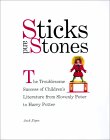Excerpts from the interview:
 ‘‘I think ‘Harry Potter’ is very typical of other populist series like ‘Goosebumps’, though it’s a level above that. It’s a very difficult phenomenon to grasp. Will it last? Time will tell. I find the Potter books very eclectic, very conventional, and (from an ideological point of view) really disturbing because of the focus on what I call ‘phallocentric power,’ and diminishment of the role of young girls in these works, when our society has changed. In contrast, one could talk about the Philip Pullman works, where he has not just a boy but a girl as well, both 12 years old, and they grow—they grapple with one another, and she has to grapple with the fact that her parents are somewhat demonic in their obsession to have power over the world. There’s no reason why a good writer of fantasy shouldn’t introduce a much more sophisticated sense of what it is to be a young woman or a young boy today, such as the hypocrisy of the church, and the way the government interferes in people’s lives. None of this can be sensed in the Harry Potter works. His world is very structured and does not change.’’
‘‘I think ‘Harry Potter’ is very typical of other populist series like ‘Goosebumps’, though it’s a level above that. It’s a very difficult phenomenon to grasp. Will it last? Time will tell. I find the Potter books very eclectic, very conventional, and (from an ideological point of view) really disturbing because of the focus on what I call ‘phallocentric power,’ and diminishment of the role of young girls in these works, when our society has changed. In contrast, one could talk about the Philip Pullman works, where he has not just a boy but a girl as well, both 12 years old, and they grow—they grapple with one another, and she has to grapple with the fact that her parents are somewhat demonic in their obsession to have power over the world. There’s no reason why a good writer of fantasy shouldn’t introduce a much more sophisticated sense of what it is to be a young woman or a young boy today, such as the hypocrisy of the church, and the way the government interferes in people’s lives. None of this can be sensed in the Harry Potter works. His world is very structured and does not change.’’
*
‘‘The Trials and Tribulations of Little Red Riding Hood (1983) was a huge anthology and also a critical study of how this tale has evolved. There are a lot of good things about Bettelheim’s book, The Uses of Enchantment, but one of the things that disturbed me was the way he took Freud and applied it in a very orthodox manner to assert that if children read fairy tales in a therapeutic session, it will work through problems of sibling rivalry, the Oedipal Complex, etc. I decided this was rather an imposition of theory on literature; there were multiple ways of reading fairy tales, and fairy tales were not altogether good. Ideologically speaking, they were very sexist, there’s some racist components, and they also had a great deal to do with authoritarian structures. I decided I would take one fairy tale which I thought he had egregiously misinterpreted, look at its history, and print as many versions, historically, as the publisher would allow me, to show that the tale was not really about a young girl who had to learn to overcome Oedipal fantasies for her father, but is actually a tale of rape and violation - a violation in which the young girl was given blame for her own rape. There are 500 to 1,000 different versions.’’
*
 ‘‘Recently, I’ve had contact with writers of so-called children’s literature. They’ll go to conferences, and they’re more interested in how they can market those works. Of course, one has to market one’s work today. At meetings of the Society of Children’s Literature, for example, they’ll have sessions on ‘how to write.’ These sessions were not held before 1945. Kafka didn’t go to a session on how to write a grotesque fable. Wanda Gág never attended a course on how to design for children or write for children. And so on. There is something about the way too many of these writers approach the field - ‘Oh, anybody can write a children’s book.’ It’s not taking the field, or children, or oneself seriously.
‘‘Recently, I’ve had contact with writers of so-called children’s literature. They’ll go to conferences, and they’re more interested in how they can market those works. Of course, one has to market one’s work today. At meetings of the Society of Children’s Literature, for example, they’ll have sessions on ‘how to write.’ These sessions were not held before 1945. Kafka didn’t go to a session on how to write a grotesque fable. Wanda Gág never attended a course on how to design for children or write for children. And so on. There is something about the way too many of these writers approach the field - ‘Oh, anybody can write a children’s book.’ It’s not taking the field, or children, or oneself seriously.
‘‘There’s a plethora of good modern fantasy today. When I come to a conference, I become humbled, because I realize I’m woefully ignorant about much of it. Even if I buy one of Ellen Datlow & Terri Windling’s fantasy anthologies, it’s impossible to have a grasp of all the fine fantasy literature that’s coming out. I find that troublesome, because what appears to rise to the top is the commercial fantasy. Unless I’m working on a project and really start sorting things out, I don’t hear about those better works. You have to become a scholarly and refined and well-educated reader in order to find it. We could spend the rest of our lives just reading remarkable fantasy works.’’

